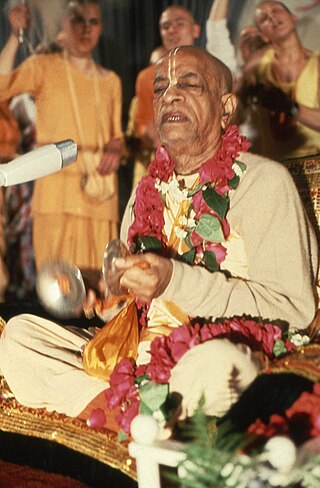
A. C. Bhaktivedanta Swami Prabhupada was a spiritual, philosophical, and religious teacher from India who spread the Hare Krishna mantra and the teachings of "Krishna consciousness" to the world. Born as Abhay Charan De and later legally named Abhay Charanaravinda Bhaktivedanta Swami, he is often referred to as "Bhaktivedanta Swami", "Srila Prabhupada", or simply "Prabhupada".

International Society for Krishna Consciousness (ISKCON), commonly referred to as the Hare Krishna movement, Gaudiya Vaishnava Hindu religious organization. It was founded by A. C. Bhaktivedanta Swami Prabhupada. on July 13, 1966, in New York City. ISKCON's main headquarters is in Mayapur, West Bengal, India and it claims approximately 1 million members globally.
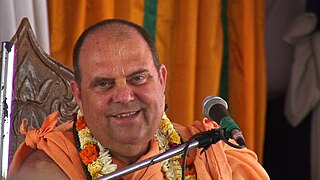
Jayapataka Swami ; born on April 9, 1949) is a Vaishnava swami and a religious leader for the International Society for Krishna Consciousness (ISKCON). He is a senior disciple of A. C. Bhaktivedanta Swami Prabhupada. In 2004 he was one of the initiating spiritual masters,, a member of the Governing Body Commission (GBC), and a divisional trustee for the Bhaktivedanta Book Trust (BBT). He is one of the senior-most sannyasis in the Hare Krishna movement.

Satsvarupa das Goswami is a senior disciple of Bhaktivedanta Swami Prabhupada, who founded the International Society for Krishna Consciousness (ISKCON), better known in the West as the Hare Krishna movement. Serving as a writer, poet, and artist, Satsvarupa dasa Goswami is the author of Bhaktivedanta Swami's authorized biography, Srila Prabhupada-lilamrta. After Prabhupada's death, Satsvarupa dasa Goswami was one of the eleven disciples selected to initiate future disciples. Satsvarupa dasa Goswami is one of the first few Westerners ordained by Bhaktivedanta Swami in September 1966. He is a Vaishnava writer, poet, and lecturer, who published over a hundred books including poems, memoirs, essays, novels, and studies based on the Vaishnava scriptures.
Ravindra Svarupa Dasa is a religious studies scholar and a Hare Krishna religious leader. He was initiated by A. C. Bhaktivedanta Swami Prabhupada in 1971. He has been a member of ISKCON's Governing Body Commission since 1987, Chairman of that Commission's North American GBC Continental Committee, is the president of ISKCON of Philadelphia, and an ISKCON Guru. He holds an M.A. and Ph.D. in Religion from Temple University and a B.A. in philosophy from the University of Pennsylvania. He has written extensively on Vaishnava philosophy and used his education to further the discourse of Gaudiya Vaishnava Theology within the context of ISKCON. He is the author of Encounter with the Lord of the Universe: Collected Essays 1978-1983. He also is featured on Shelter's Attaining the Supreme, where he gives a lecture on a hidden track.
The Oxford Centre for Hindu Studies, founded in 1997 and based in Oxford, England, is a research academy focused on the study and teaching of Hindu cultures of India and Nepal. It develops academic programmes of education, research and publishing in Hindu studies. It aims to encourage the Hindu community in the academic study of their own traditions and cultures. Till 2020, it functioned as a "recognised independent center" under the University of Oxford.

Kirtanananda Swami, also known as Swami Bhaktipada, was a Gaudiya Vaishnava guru, the co-founder of New Vrindaban, a Hare Krishna community in Marshall County, West Virginia, where he served as spiritual leader from 1968 until 1994, and a convicted criminal.

Radhanath Swami is an American Hindu Gaudiya Vaishnava guru, community-builder, activist, and author. He has been a Bhakti Yoga practitioner and a spiritual teacher for more than 50 years. He is the inspiration behind ISKCON's free midday meal for 1.2 million school kids across India, and he has been instrumental in founding the Bhaktivedanta Hospital in Mumbai. He works largely from Mumbai and travels extensively throughout Europe and America. In the International Society for Krishna Consciousness (ISKCON), he serves as a member of the Governing Body Commission. Steven J. Rosen described Radhanath Swami as a "saintly person respected by the mass of ISKCON devotees today."
Kenneth R. Cracknell was a British theologian who specialised in interfaith dialogue and the Christian theology of religions.

Sachinandana Swami is a Gaudiya Vaishnava guru, sannyasi, and one of the religious leaders of the International Society for Krishna Consciousness.

Jayatirtha Das, formerly Jayatirtha Goswami, was one of the leading disciples of A. C. Bhaktivedanta Swami Prabhupada and a guru within the International Society for Krishna Consciousness. Born James Edward Immel and also known as Tirthapada, Bhakti Vijaya Tirtha and Vijaya Acharya, Jayatirtha was appointed a life trustee of the Bhaktivedanta Book Trust by his guru, Prabhupada, who also placed him in the managerial post of the fledgling Spiritual Sky company. Under Jayatirtha's able management the company became a multimillion-dollar concern and the Wall Street Journal covered the company's success with a front-page article.

Ravi M. Gupta, also known as Radhika Ramana Dasa, is a notable Vaishnava scholar, author, and editor. Gupta holds the Charles Redd Chair of Religious Studies at Utah State University, and serves as director of its Religious Studies program. He is a member of the International Society for Krishna Consciousness.
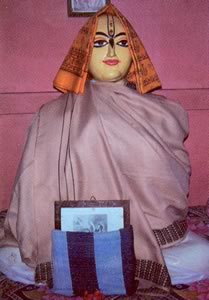
Haridasa Thakur was a Vaishnava saint known for playing a part in the initial propagation of Gaudiya Vaishnavism. He is considered to be a known convert of Chaitanya Mahaprabhu, along with Rupa Goswami and Sanatana Goswami. His story of integrity and faith in the face of adversity is told in the Chaitanya Charitamrita. It is believed that Chaitanya Mahaprabhu himself designated Haridasa as nāmācarya, meaning the 'teacher of the Name'. Haridasa Thakura was a devotee of the deity Krishna, and is regarded to have practised the chant of his veneration, the Hare Krishna mantra, 300,000 times daily.
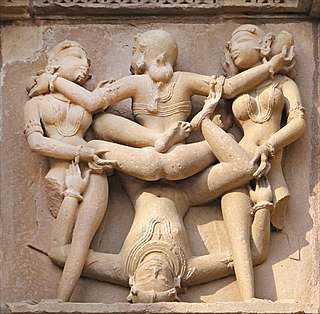
Hare Krishna views of homosexuality, and especially the view of the International Society for Krishna Consciousness (ISKCON) towards LGBT issues, are similar to their views of heterosexual relationships, i.e. because the living entity is identifying with the body, any attraction based on the desire to gratify the body and its senses is symptomatic of illusion and can be purified by progressively elevating the consciousness. Put simply, both hetero- and homosexual attraction is due to an illusory attachment to the temporary body. Same-sex relations and gender variance have been represented within Hinduism from Vedic times through to the present day, in rituals, law books, mythical narratives, commentaries, paintings, and sculpture. The extent to which these representations embrace or reject homosexuality has been disputed within the religion as well as outside of it.

An ISKCON guru is a person who is permitted to initiate disciples into the International Society for Krishna Consciousness system. The guru system has undergone several changes and reform since its beginnings in the 1960s. Upanayana as a traditional "sacred thread ceremony" of the Gayatri Mantra, commonly known Hindu Samskara, is complemented by Pancaratric mantras of the Gaudiya Vaishnava sampradaya and follows the principal initial nama initiation ceremony, referred to respectively as brahmana diksa and Hari nama diksa.

The ISKCON Communications Journal (ICJ) was a biannual magazine of dialogue, focussing on issues related to missionary development in ISKCON and with issues of communication, administration, social development and education which affected mission in ISKCON. ICJ also provided a forum for members of various communities to comment on ISKCON's development. It was established in 1993 and was published by ISKCON Communications Europe until its last issue appeared in 2005.

Ferdinando Sardella, born 1960, is a Swedish scholar of the history of religions, Hinduism, and religious studies, the former director and coordinator of the Forum for South Asia Studies at Uppsala University.
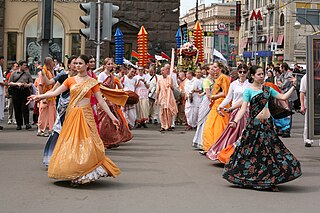
Festival of Chariots refers to the Ratha Yatra festivals run by the International Society for Krishna Consciousness (ISKCON). The main event is a chariot procession through the streets. The procession may then be followed by performing arts presentations on the stage and visiting various booths encamped at a park site. The festivals involve chants, the arts, music, and free vegetarian feasts that can be seen over the world but specifically in the United States. ISKCON, commonly referred to as Hare Krishna is a branch of Hindu religiosity. ISKCON have used the practice of Hindu festivals as an important element of Hare Krishna expression, and is a recognisable feature of their appearance in the public realm. Kirtan is an element that is common to all ISKCON festivals. Kirtan is a process of musical worship, that is accessible for group participation and as described by Edwin Bryant as “Krishna in vibratory form”. The practice of kirtan are melodies, mantras, spiritual texts that proclaim God's name in his many forms. The ‘Festival of India’ is the International society for Krishna consciousness conveying Indian expression in the global sphere.

Kailasa Candra Dasa, also known as J. K. Goodwin, is an American Gaudiya Vaishnava teacher, sidereal astrologer and author with a small number of students. In 1972, he joined the International Society for Krishna Consciousness (ISKCON) in Madison, Wisconsin. After the passing of ISKCON founder A. C. Bhaktivedanta Swami Prabhupada, he opposed ISKCON's "zonal acharyas", beginning in 1978 and 1979. He is co-founder of the Vaishnava Foundation, a nonprofit organization incorporated under the name Metamorphosis League for Monastic Studies. He works out of the United States. He continues to oppose what he sees as the deviations that emerged within ISKCON after the demise of A. C. Bhaktivedanta Swami Prabhupada.















